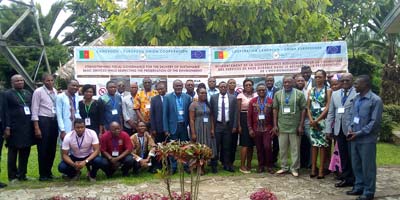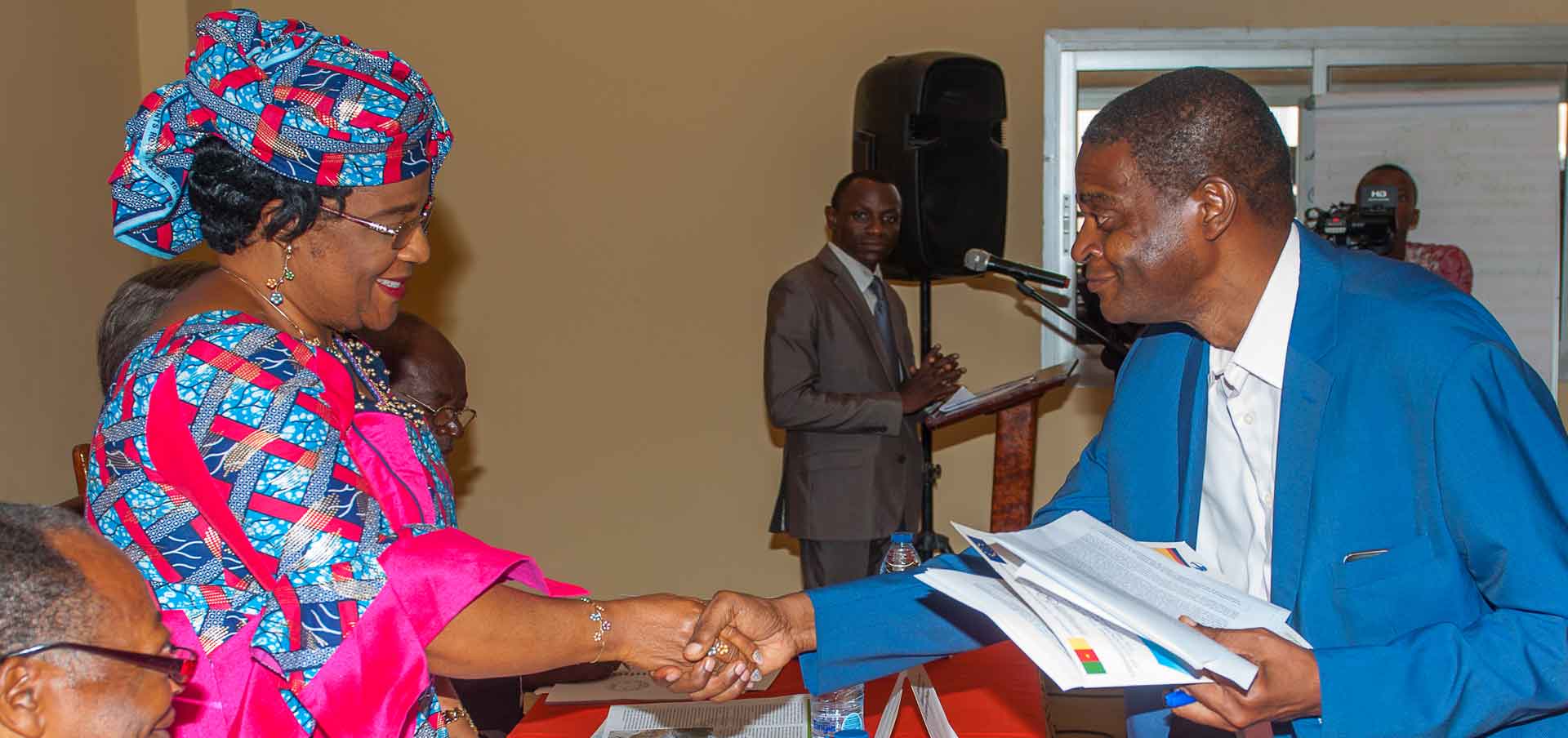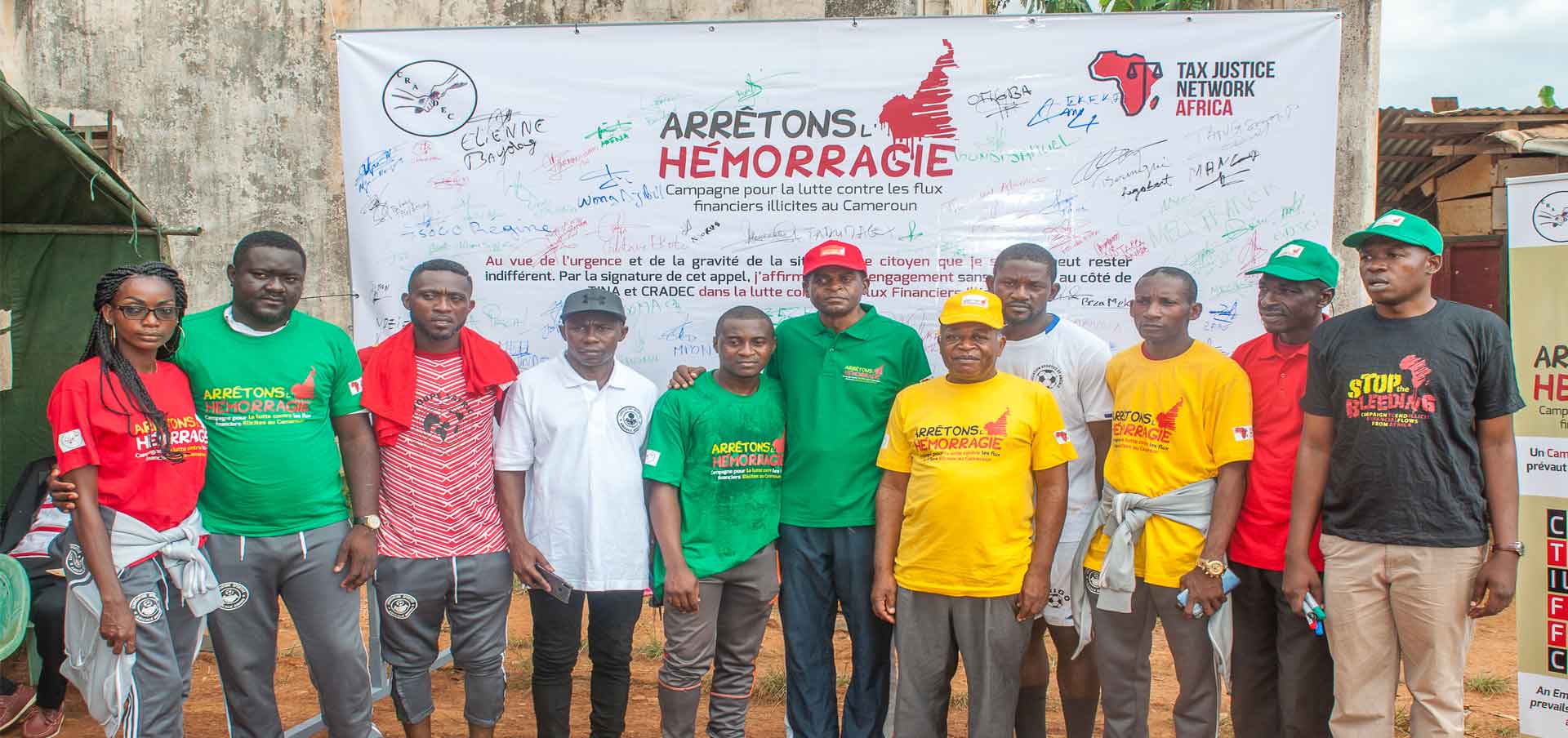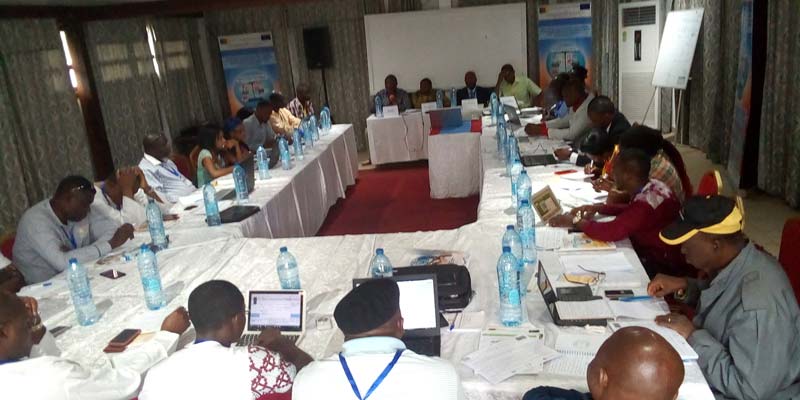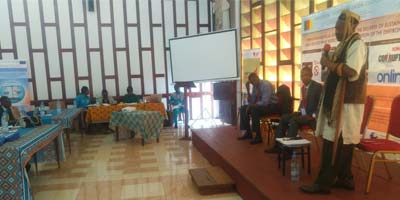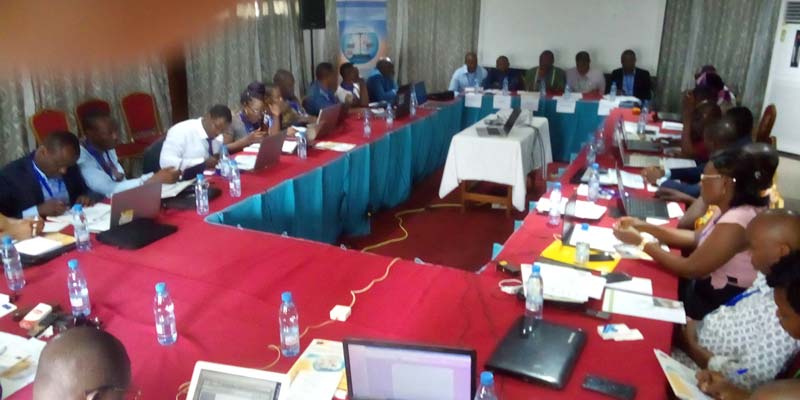1. PRESENTATION OF THE PROJECT
The project "Strengthening Budgetary Governance for the Provision of Sustainable Basic Services While Respecting the Preservation of the Environment" meets the objective of the Cameroon-European Union cooperation strategic plan to support organizations in society. Cameroonian civilians in their efforts to contribute to inclusive and sustainable growth in Cameroon. The lifespan of the project is four (4) years and the implementation started in March 2019.
In the context of the implementation of the SDGs, the main objective of the project is to contribute to the strengthening of fiscal governance for an improvement in the effectiveness and efficiency of public policies (Areas of financing of the economy; public sector and mining industries) as well as people's access to quality information (accurate, understandable, exhaustive and complete) in the context of the implementation of the Sustainable Development Goals (SDGs).
More specifically, it is about:
(i) Fight against illicit financial flows;
(ii) Strengthen the public order system;
(iii) Promote the implementation of the principle of environmental and social responsibility in mining projects in Cameroon, and
(iv) Communicate and make visible the activities and results of the action on good fiscal governance in connection with the related themes and sectors of the action through messages of information, mobilization and commitment.
The expected results are:
• Increased domestic budgetary resources;
• A more effective and efficient public procurement system for the provision of quality basic services;
• An improved and sustainable standard of living for the populations living around mining sites and the entire country;
• The effects and impacts of the action on fiscal governance in Cameroon are amplified.
A review of the political capacities of the co-applicants of the project should be undertaken to determine the progress made in the achievement of the objectives, the results and to identify the corrections to be taken, if necessary. The conclusions of this review will be incorporated for better stakeholder involvement and improvement of monitoring-evaluation / budget control capacities for improved implementation during the rest of the project.
2. CONTEXT AND JUSTIFICATION FOR THE IMPLEMENTATION OF THE PROJECT
As part of the formulation of the action, the Consortium of CSOs carrying the project and the Delegation of the European Union Commission to Cameroon, agreed on the scope and place of the interdependent themes developed in relation to the strategy. national development. These are: (i) the fight against illicit financial flows for optimal financing of the national economy; (ii) transparency in the public investment budget procurement process for good quality spending in line with the basic needs of the populations; (iii) respect for the principle of social and environmental responsibility in mining by extractive companies and (iv) monitoring and accountability in the implementation of the sustainable development objectives of the United Nations 2030 agenda .
The December 2015 report of Global Financial Integrity (GFI) “Illicit financial flows from developing countries: 2004-2013”, underlines that Cameroon is deprived of an average of US $ 752 million annually. More specifically, over the period from 2003 to 2014, trade experienced a drain in illicit financial flows estimated on average at 6% of total exports. These financial volumes negatively affect the achievement of national development objectives in terms of education, health, basic infrastructure, water, electricity, etc. The action aims for an average reduction of one percent of this bleeding at the level of exports, by relying on progress in transparency in the extractive industries, good governance in public finance in Cameroon.
The transparency and accountability which are factors in the promotion and culture of good governance are conditioned by the generation, verification, comparison and publication of data on the public procurement chain. Law No. 2018/366 of 20/06/2018 on the public procurement code, although dealing with the dematerialization of the procurement procedure, does not contain provisions relating to the opening of data at all stages. The execution of the public investment budget must meet the public service needs in quantity and quality of the grassroots populations. On this principle, the population finds that the level of transparency in the chain of public contracts for the realization of essential basic services is low, if not zero. This results in a lack of traceability of information from the call for tenders to the reception of the contract through the execution of the contract. The target of the action is at least 16% of the 360 municipalities that perceive transparency in the procurement system that concerns them. This will have a considerable effect on the quality of budgetary expenditure, by relying on the promotion of an open data standard with a focus on public procurement contracts (Open Contracting Data Standard / OCDS), for more transparency and efficiency in this sector.
The mining activity certainly represents enormous economic challenges for the State and the populations. However, it has negative consequences on water resources, air quality, wildlife, soil quality, climate change. The environmental legal and regulatory framework from 1996 to 2016 has continued to evolve with new provisions for a more responsible mining sector. However, there are limits on the one hand, due to the fact that the occurrence of mining activities in semi-mechanization was not taken into account in the 2001 code and on the other hand, the taking into account of this type activities in the new 2016 code, is not yet effective, due to the absence of the implementing decree. With regard to respect for environmental preservation, we observe, for example, that mobile hearings as part of the mining and quarrying license concessions process are organized in places far from the populations directly affected by the mine.
Therefore, it is difficult to develop specifications that take into account the concerns of the populations. Monitoring must be done to monitor compliance with mitigation measures and make proposals to harmonize environmental and mining provisions that reflect the realities of the extractive sector. This will allow the development of a dashboard to measure the national implementation of the VMA through indicators on the environmental and social responsibility of operating companies, for better living conditions of the populations living near mining sites. and Cameroon in general. The action would like to change the situation by ensuring that at least 50% of fairground audiences are held in the villages bordering the operating sites, thus leading to greater respect for their specifications of environmental and social management plans by the mining sector operators.
Monitoring and Accountability in the implementation of the SDGs is the confluence of the three thematic objectives. It will allow civil society, through the various existing and developing tools, to contribute to the generation and presentation of simplified qualitative and / or quantitative indicators of the various targets in the national SDG implementation report in Cameroon. The new global development framework, unlike the MDGs, was based on a broad process of consultations with stakeholders, including CSOs, in order to effectively meet the expectations of the people.
From the vision of “The world we want” to the reality of “Leaving no one behind” of the 2030 agenda, the action makes the Commune (Decentralized Territorial Collectivity) within the meaning of Cameroonian legislation the unit of implementation. implementation, monitoring and evaluation of the SDGs. Therefore, it will be important to measure the level of participation of the populations in the implementation of the SDGs. At least 16% of Communes have a Monitoring and Accountability Supervision Framework in SDG implementation and are integrated into the national SDG implementation system.
3. OBJECTIVES OF THE MISSION
The purpose of this mid-term evaluation is to determine the level of progress made in achieving the objectives of the project / program. The review will examine project performance and implementation of planned activities against actual results. The risks associated with achieving the results and objectives of the project will also be assessed. The objective of the assessment is also to identify strategic corrective actions and to formulate relevant recommendations for possible changes in the design of the project and the general direction of the project.
The assessment will include:
• Review the effectiveness, efficiency and implementation of the project according to the timetable;
• Analyze the effectiveness of the implementation of partnership agreements;
• Identify problems requiring decisions and corrective actions;
• Identify lessons learned from the development, implementation and management of projects;
• Highlight technical achievements and lessons learned;
• Determine if the project is achieving the expected results; and
• Propose corrections and / or adjustments to the work plan and management measures as needed.
4. EXPECTED RESULTS
The results of the evaluation will be addressed primarily to the Leader of the consortium for the implementation of the project which is the CRADEC and, to the contributors of the project such as the co-applicants, and the European Union as a funder, but will also serve the target groups involved in the change, the stakeholders; and adjustments are defined for better performance on the one hand and a perspective of sustainability of the action is developed after the implementation of the action on the other hand.
5. APPROACH, METHOD AND DELIVERABLES OF THE EVALUATION
5.1 Approach and Method
The mid-term review will use a participatory approach whereby the main parties are consulted and throughout the review process. The quantitative and qualitative evaluation methods will be used to determine the achievements of the project in relation to the expected results and impacts. It is strongly recommended that the consultant (s) maintain close communication with the project team and (similarly with other stakeholders) and promote the exchange of information throughout the development phase. implementation of the review to allow better ownership of the results of the review.
The conclusions of the review will be based on the following elements:
• Documentary review of project documents and relevant communications;
• Interviews (individual or group) with:
- The Delegation of the European Union in Cameroon;
- The project management team;
- Co-applicants, etc.
Other data collection tools: to be determined by the consultant based on the information needed to complete the review.
5.2 Review deliverables and procedures
The review team will prepare:
i. Inception report: After the consultant's initial contact and methodology definition meeting, the consultant will produce an initial report summarizing the interviews and the main components of the project. This initial report will ensure that all sources of information have been consulted. It will also help verify emerging results.
ii. The preliminary report: this report should contain an executive summary that can serve as a stand-alone document; a detailed analysis of the results of the evaluation organized according to evaluation criteria.
iii. Examination of the preliminary report: CRADEC and the Co-Applicants will examine the preliminary report. Once a draft has been peer reviewed and accepted, the project manager will share the approved draft with key project stakeholders for review and comments. Stakeholders will be able to comment on factual errors and underline their importance in the conclusions, as well as in the recommendations and lessons learned. All comments or responses to the preliminary reports will be forwarded for consolidation. The latter will send all comments to the evaluation team for consideration in the preparation of the final report.
iv. The final report: The evaluation team will submit a final report after providing all comments.
6. REQUIREMENTS AND QUALIFICATION OF THE CONSULTANT
The selection of consultants will be based on the following qualifications:
• A graduate degree in environmental science, international development or any other relevant field of political or social science;
• At least 10 years of technical experience in project evaluation, including evaluation of large-scale, regional or global programs, using a theory of change approach;
• A broad understanding of questions of domestic resource mobilization, illicit financial flows within medium-sized economies, public markets, etc.;
• Relevant experience in the monitoring and evaluation of multi-landscape projects, including sustainable management projects;
• Analytical skills and demonstrated ability to propose changes in approach to achieve proposed project results.
• Fluency in the French language is required;
• Have a good understanding of tax justice issues on the African continent and understanding of policy-based programming and advocacy approaches;
• Have a good knowledge and experience of the CSO sector, in particular at the national level;
• Mastery of IT tools (Word, Power Point, Excel, etc.)
• Have strong analytical and writing skills;
• Communication, writing and presentation skills;
• Knowledge of the European Union system.
Consultants may not have participated in the preparation, formulation and / or implementation of the project (including drafting of the project document) and must not be in conflict of interest with activities related to the project. project.
8. CALENDAR AND DURATION
Duration of the service: 20 days spread over 01 month of work.
9. FILE TO BE PROVIDED
Candidates interested in providing the service must provide:
• A technical offer describing the understanding of the consultation, the methodology and the work plan to be followed for carrying out the study;
• A CV
• A financial offer for the consultation, taking into account the 20 working days over a period of 30 days;
• An up-to-date tax file.
Applications must be submitted or sent to CRADEC, Email: This email address is being protected from spambots. You need JavaScript enabled to view it. in copy This email address is being protected from spambots. You need JavaScript enabled to view it., Tel: 694 476 244, located at Montée Zoé, Immeuble Express Union, no later than January 20th, 2022.




